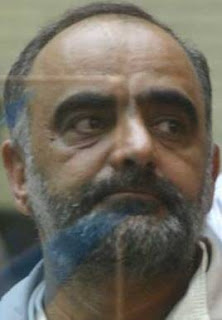A notorious judge has been dismissed and his department has been merged into the Revolutionary Court.
The departure of Judge Hassan Haddad, deputy prosecutor for security affairs, was announced by Hossein Lotfi, the new presiding judge of the Revolutionary Court, last week as he took over the reigns from Hojjatoleslam Assadollah Mobasheri.
Hassan Haddad had long been one of the key repressive tools of the regime within the judiciary. Shunning the limelight (the photo to the right is one of the rare ones of him and was released by the group Human Rights Activists of Iran), Haddad has tried to remain an enigmatic and behind-the-scenes figure. Even the name he has used for years is an alias. His real name is Hassan Zareh Dehnavi.
An interrogator/torturer in Evin prison in the 1980s, he was relieved of his functions in 1989 for 'financial misconduct' and 'questionable relations with several prisoners.' This did not prevent officials from transferring him to the Enforcement Staff of the Imam's Decree, a financial behemoth fronting as a foundation, as an inspector of confiscated property.
In the late 1990s, he became head of the 26th branch of the Revolutionary Court, in charge of trying drug and antiquities traffickers. He was given more sensitive cases, for example that of dissident journalist Akbar Ganji, towards the end of that decade. He was named deputy prosecutor for security affairs in 2006.
Most recently, he has been involved in the prosecution of seven Baha'is who face the death penalty on charges of spying for Israel. He is held responsible for the death in custody of Iranian-Canadian photographer Zahra Kazemi. He was involved in the prosecution of journalist Roxana Saberi, researcher Haleh Esfandiari, and Kian Tajbakhsh. Other cases that he directed include those against student leaders Ali Nikounesbati and Ali Azizi, striking workers of the Tehran transit company including the union's leader Mansour Osanlou, and newspaper editor Heshmatollah Tabarzadi.
As deputy prosecutor for security affairs, Haddad handled 'national security' cases, a catchall phrase used to prosecute anyone considered a threat to the regime. 'National security' cases, known as political cases in most of the world, fall under the jurisdiction of the Revolutionary Court.
Revolutionary Court Presiding Judge Hossein Lotfi had not announced Haddad's successor last week, an omission which had puzzled observers. However, newly-appointed Tehran Prosecutor Jafari Dolatabadi said at a ceremony yesterday that the deputy prosecutor for security affairs' office would be merged into the General and Revolutionary Prosecutor's Office.
Hadded had been the deputy of another hated judicial figure, former Tehran Prosecutor Saeed Mortazavi, who was also recently dismissed. Mortazavi however was reassigned as Deputy Prosecutor General, a relative promotion which many analysts viewed as a way to sideline him at a desk job with no influence over the prosecution of defendants. Judge Haddad's new functions have not been declared.
The regime has replaced many figures linked to the recent crackdown and the repression of the past decade. But the steps appear to be cosmetic and have not affected the repressive tilt of the Islamic Republic. If anything, the moves seem to be geared towards streamlining the regime. For example, Basij commander Hassan Taeb was recently moved from the command of the Basij forces to that of the Revolutionary Guards (IRGC) intelligence unit, which many analysts believe is fast replacing the civilian- and Majlis-controlled Intelligence Ministry as the country's most powerful security body. Taeb was subsequently replaced at the Basij by IRGC General Mohammad Reza Naghdi, no less of a zealot than Taeb, but with the advantage of being relatively unknown to the general public. The Basij has now been merged into the ground forces of the IRGC.
The changes at the Revolutionary Court notwithstanding, protesters continue to be sentenced to death, the execution of juvenile offenders are railroaded through the judiciary, and dozens of political prisoners still languish in prison without access to their lawyers. And this week, Prosecutor General Gholam Hossein Mohseni Ejei even went so far as to say in an interview that opposition leaders Mehdi Karroubi and Mir Hossein Mousavi would soon be brought to justice.
Subscribe to:
Post Comments (Atom)





The case against Haleh Esfandiari was a good one. She admits herself that she must have appeared to the security services to be "the perfect suspicious person", and that everything she said in her 'confession video' was true. What she has never done is explain why she wasn't guilty as charged. Read http://www.peakoil.org.au/news/index.php?esfandiari.htm and judge for yourself.
ReplyDelete